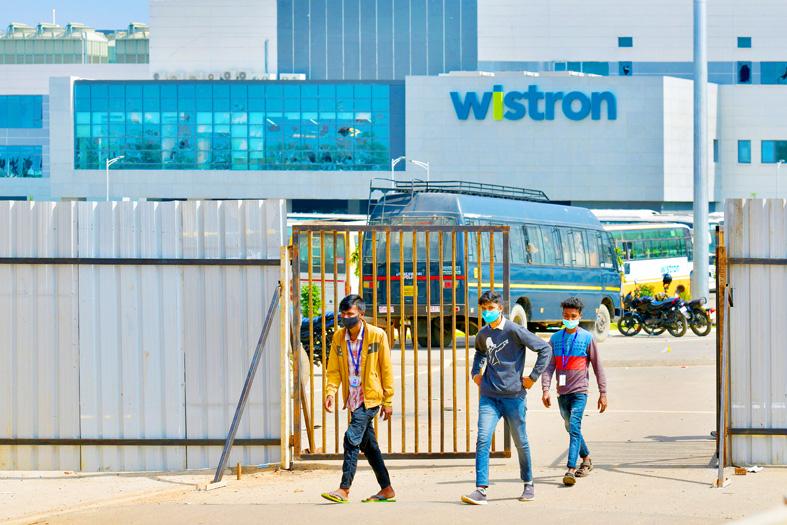A riot on Saturday broke out at an iPhone factory run by Wistron Corp (緯創) in India, reportedly over unpaid wages, although the company had commissioned employment agencies to pay workers, a source said.
Reports in Indian media that Wistron was paying workers less than the agreed upon amount were inaccurate, said a Taiwanese businessperson with knowledge of the situation, who asked not to be named to protect their identity.
Wistron had commissioned five staffing agencies to recruit workers and had made full payments to the firms on time, the source said.

Photo: AFP
The riots at the factory might have resulted from disputes among the contracted labor agencies and employees, but there are some issues that are not clear, the source said.
It is unclear whether the violence at the plant was instigated by employment agencies or Indian factory managers in an attempt to extort the company, taking advantage of its unfamiliarity with the laws and regulations in the country, the source said.
The riots broke out when about 2,000 workers at Wistron’s new factory in the Narasapura industrial area in Karnataka State ended their night shift by destroying furniture and factory assembly units, and setting vehicles on fire, Indian media reports said.
Police rushed to the scene and broke up the riots, arresting about 100 people, they said.
The Times of India reported that the workers were angry because they were not being paid the wages that had been agreed on when they were recruited.
Wistron said the incident was not a strike, but rather a criminal incident, as the factory was targeted by criminals.
The rioters were outsiders, not factory employees, a Wistron representative said, adding that the Indian government was also investigating the incident.
Some office furniture at the factory was damaged, but equipment on the main assembly lines and the warehouses remained intact, the representative said.
“We are deeply shocked by the events at our Narasapura facility,” Wistron said in a regulatory filing yesterday. “We follow the law and are supporting the authorities with their investigation.”
The company said the safety and wellbeing of its team members are always its top priority, and promised to follow local labor regulations and resume operations as soon as possible.
“We will collaborate with related parties to provide any help needed for the employees,” it said.
Ben Wang (王永平), head of the Taiwan office in Chennai, India, yesterday said that he had discussed the matter with Karnataka Chief Minister B.S. Yeddyurappa and the state’s Minister for Large and Medium Scale Industries Jagadish Shettar.
State authorities promised that it would ensure the safety of Taiwanese businesses and expedite an investigation into the riots, Wang said.
They also said that the incident would not become a deterrent to Taiwanese investment in the state, said Wang, who is visiting the state’s capital, Bangalore, at the invitation of the Karnataka government.
Shettar on Saturday said the state government would provide Wistron and other foreign companies invested in the state with necessary protection.
The incident “occurred over the nonpayment of salary due for several months,” the minister said in a press statement. “The protest against the management turned violent after some people started vandalizing the office, setting vehicles on fire, pelting stones and setting the company’s board on fire.”
Expressing regret over the incident, Shettar said it is not right to take the law into one’s own hand, no matter the problem.

In Italy’s storied gold-making hubs, jewelers are reworking their designs to trim gold content as they race to blunt the effect of record prices and appeal to shoppers watching their budgets. Gold prices hit a record high on Thursday, surging near US$5,600 an ounce, more than double a year ago as geopolitical concerns and jitters over trade pushed investors toward the safe-haven asset. The rally is putting undue pressure on small artisans as they face mounting demands from customers, including international brands, to produce cheaper items, from signature pieces to wedding rings, according to interviews with four independent jewelers in Italy’s main

Macronix International Co (旺宏), the world’s biggest NOR flash memory supplier, yesterday said it would spend NT$22 billion (US$699.1 million) on capacity expansion this year to increase its production of mid-to-low-density memory chips as the world’s major memorychip suppliers are phasing out the market. The company said its planned capital expenditures are about 11 times higher than the NT$1.8 billion it spent on new facilities and equipment last year. A majority of this year’s outlay would be allocated to step up capacity of multi-level cell (MLC) NAND flash memory chips, which are used in embedded multimedia cards (eMMC), a managed

In the wake of strong global demand for AI applications, Taiwan’s export-oriented economy accelerated with the composite index of economic indicators flashing the first “red” light in December for one year, indicating the economy is in booming mode, the National Development Council (NDC) said yesterday. Moreover, the index of leading indicators, which gauges the potential state of the economy over the next six months, also moved higher in December amid growing optimism over the outlook, the NDC said. In December, the index of economic indicators rose one point from a month earlier to 38, at the lower end of the “red” light.

Japanese Prime Minister Sanae Takaichi has talked up the benefits of a weaker yen in a campaign speech, adopting a tone at odds with her finance ministry, which has refused to rule out any options to counter excessive foreign exchange volatility. Takaichi later softened her stance, saying she did not have a preference for the yen’s direction. “People say the weak yen is bad right now, but for export industries, it’s a major opportunity,” Takaichi said on Saturday at a rally for Liberal Democratic Party candidate Daishiro Yamagiwa in Kanagawa Prefecture ahead of a snap election on Sunday. “Whether it’s selling food or